EGC affiliates present research at Rwanda policy dialogue featuring Yale President Peter Salovey
The March 11 event was chaired by Dr. Jean Chrysostome Ngabitsinze, Rwanda’s Minister of Trade and Industry, and showcased Yale’s policy-engaged research collaborations in the country. It was hosted by Yale Economic Growth Center, Inclusion Economics at Yale University, and the International Growth Centre.
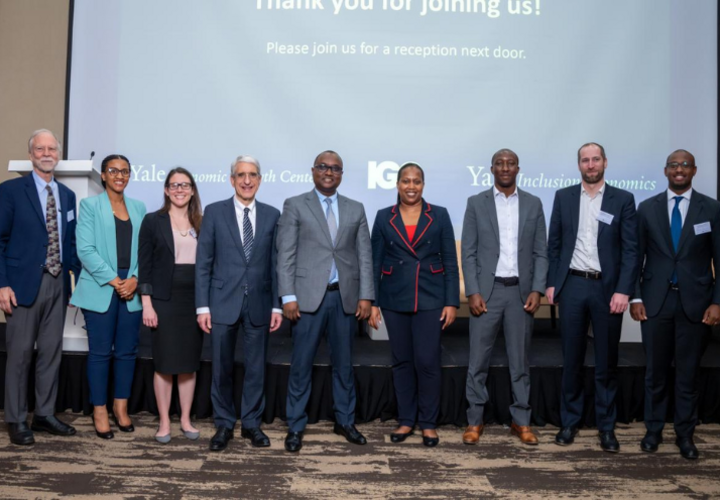
Looking back at “Collaboration through Research: Pathways to Evidence-based Policy in Rwanda”
Yale President Peter Salovey delivered welcoming remarks that described Yale’s contribution to transforming research into policy in Africa at a March 11 policy dialogue that took place in Kigali, Rwanda. Yale faculty are currently engaged in a variety of projects in the country, which span last-mile infrastructure investments to industrial policy, and are made possible through collaboration with policymaker and practitioner partners, several of whom were present at the event.
The policy dialogue was chaired by Dr. Jean Chrysostome Ngabitsinze, Rwanda’s Minister of Trade and Industry, and featured Yale economists Lauren Falcao Bergquist and Kevin Donovan, who presented their ongoing Rwanda-based research collaborations.
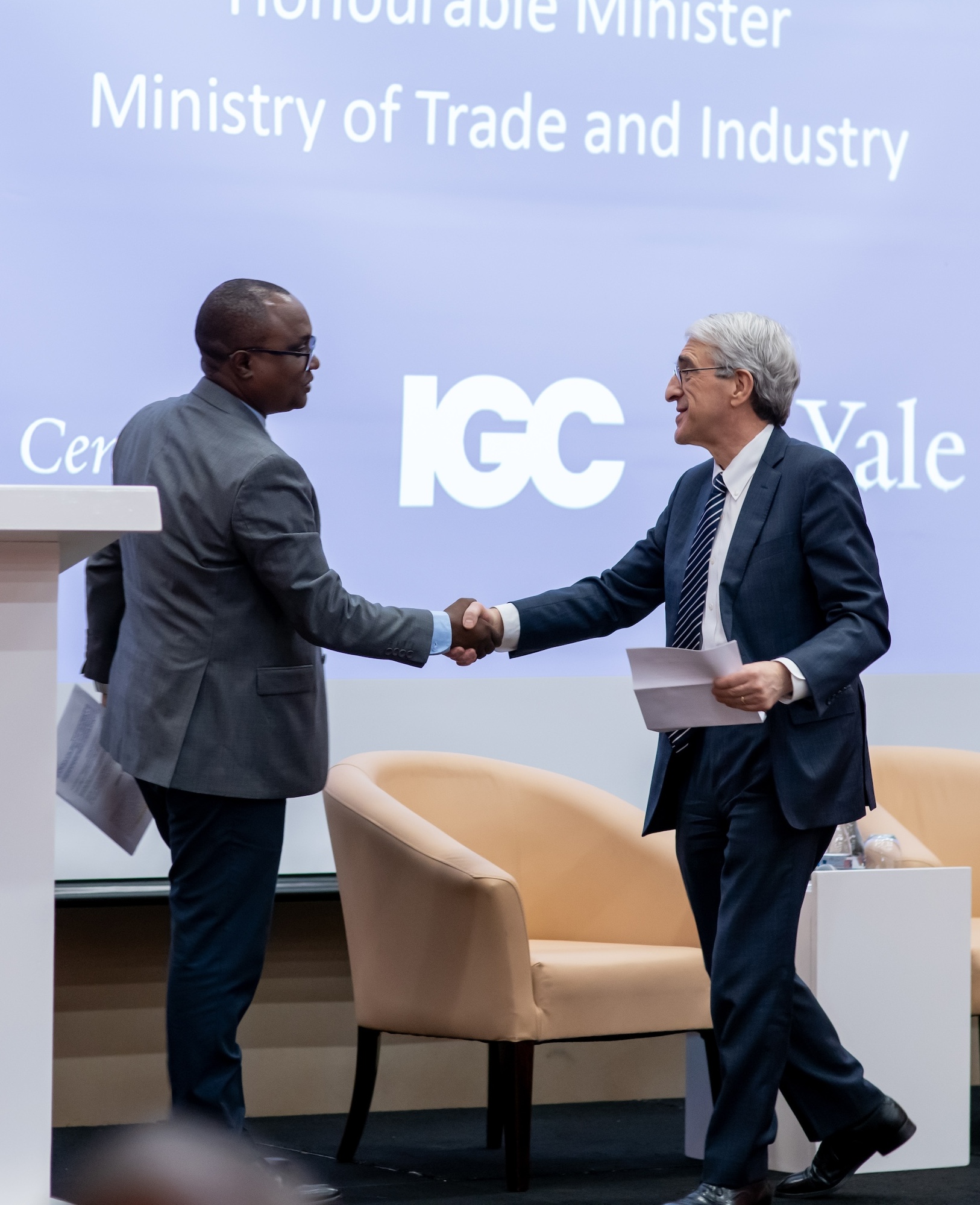
Dr. Jean Chrysostome Ngabitsinze, Rwanda’s Minister of Trade and Industry (L) introduces Dr. Peter Salovey, President of Yale University at the March 11, 2024 event. Photo by Ian Christmann.
Event attendees, including the Ministers of Infrastructure and Trade and Industry and other policymakers, academics, development partners, and Yale alumni, took part in discussion which focused on approaches to grounded, timely, and policy-relevant research in Rwanda.
In his inaugural remarks as Yale’s president in 2013, Salovey launched an initiative to strengthen ties between Yale and Africa by fostering new directions in research on Africa, and identifying new partnerships and deepening existing ones, all while transforming the educational experiences and career opportunities of students at Yale and in Africa. Throughout his tenure as president, Salovey, who announced his intention to step down earlier this year to return to a full time faculty role, has continued to leverage the power of partnerships and global networks across the continent to create new knowledge in science, public health, business, and other disciplines – and to improve lives around the globe.
The March 11 event was hosted by the Yale Economic Growth Center (EGC), Inclusion Economics at Yale University (YIE), and the International Growth Centre (IGC), based at the London School of Economics. At its founding in 1961, EGC was the first research center dedicated to quantitative analysis of low- and middle-income economies at a major university in the United States, and has played a key role in furthering Yale’s mission to promote research collaborations across many regions, including sub-Saharan Africa. Additionally, EGC hosts the International and Development Economics (IDE) master’s program, which in 2022 launched a Sub-Saharan African Student Scholarship, with the aim of providing new opportunities for excellent students from a region central to development economics, and encouraging further diversity in the program.
In his remarks, Salovey spoke about Yale’s commitment to global collaboration and extending the university's outreach to foster educational partnerships in Africa. He noted the mutual benefits of academic collaboration, saying, “Rwanda is at the forefront in Africa in seeking out research to inform policy and this policy dialogue highlights the research of Yale faculty within the deep partnerships they have developed in this country.” A key component of EGC, YIE and IGC’s work together is to help enable the insights of economics research to support policy decision-making in close collaboration with government and other counterparts.
Research focused on advancing economic growth in Rwanda
Lauren Falcao Bergquist, an Assistant Professor of Economics and Global Affairs at Yale Jackson School of Global Affairs and the Economics Department and an EGC affiliate, presented her ongoing research collaboration with the Development Bank of Rwanda and Ministry of Trade and Industry focusing on the Export Growth Fund, a key instrument of Rwanda’s industrial policy. In this initial stage, Bergquist and coauthors find that firms receiving loans from the fund had a 50 percent increase in revenues, 30 percent increase in employment, and increased probability of export after two years, with strongest effects concentrated in smaller firms.
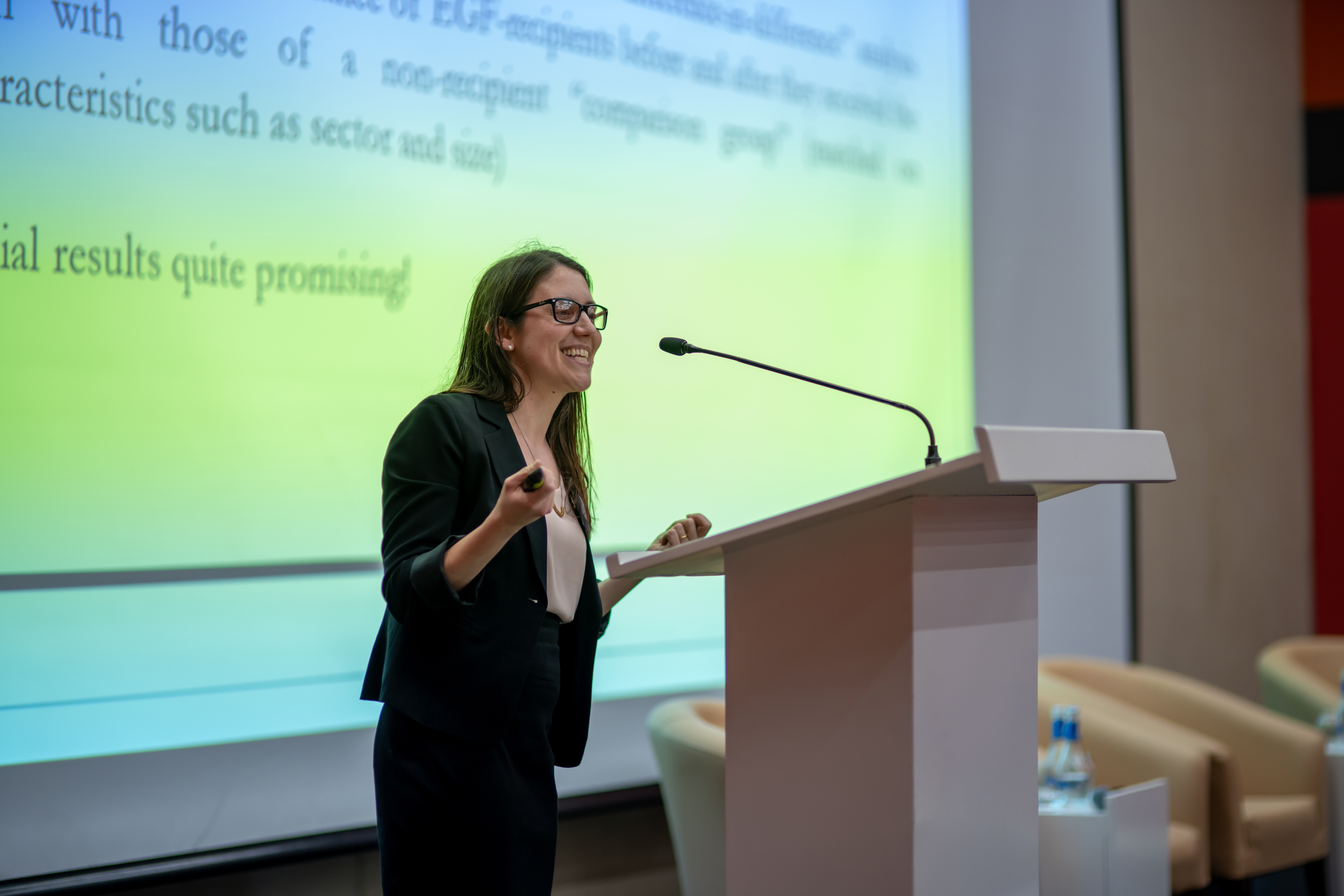
Director General Antoine Kajangwe from the Ministry of Trade and Industry joined the discussion, reflecting on how important this first research phase was for evidenced-based decision-making. He said that research insights are important for deploying human and capital resources and negotiating between competing priorities. Bergquist’s research collaboration with the Ministry is now entering the stage where partners will deploy a full-scale randomized controlled trial to assess impacts of the fund. Bergquist also discussed core elements of her approach to policy-engaged research projects: that they be driven by demand from local policymakers, consist of deep and regular engagement, and involve phases with clear inflection points – where insights can be put to use without waiting on a published paper.
Voices in Development Podcast: Lauren Bergquist
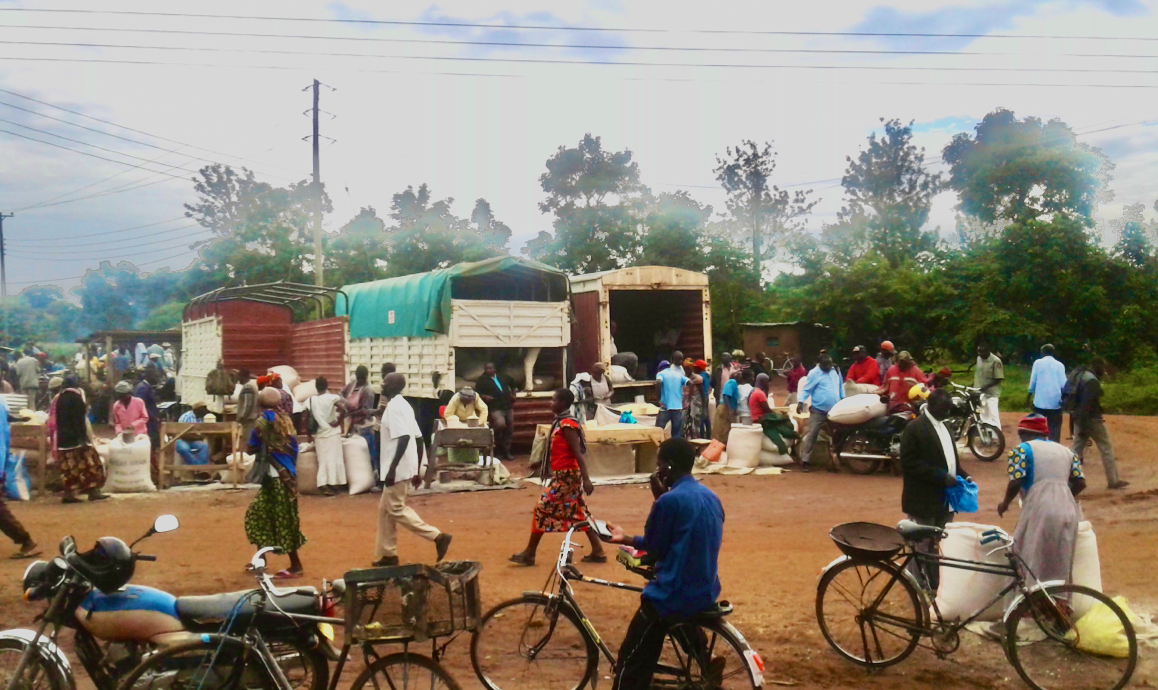
In this episode EGC's podcast, Bergquist discusses her research on agricultural markets in East Africa, emphasizing the criticality of research on both food supply and distribution. She describes her work as focusing on "how to get food from areas of surplus to areas of deficit, from times of plenty to times of need."
Kevin Donovan, an Associate Professor of Economics at the Yale School of Management and an EGC affiliate, discussed his study with the NGO Bridges to Prosperity in collaboration with the Ministry of Infrastructure, the Transport Development Agency (RTDA), and Rwanda Polytechnic. Together, they study the use of footbridges in connecting people to local markets. By collaborating with Rwanda’s central government, Donovan and co-investigators were able to randomize the construction of approximately 200 footbridges across the country reaching over 802,000 people. Preliminary results based on interviews with 65,000 people annually from 2020-2024 show significant reductions in reported household food insecurity and increases in agricultural income, especially for those in villages where community members are particularly challenged in reaching local markets.
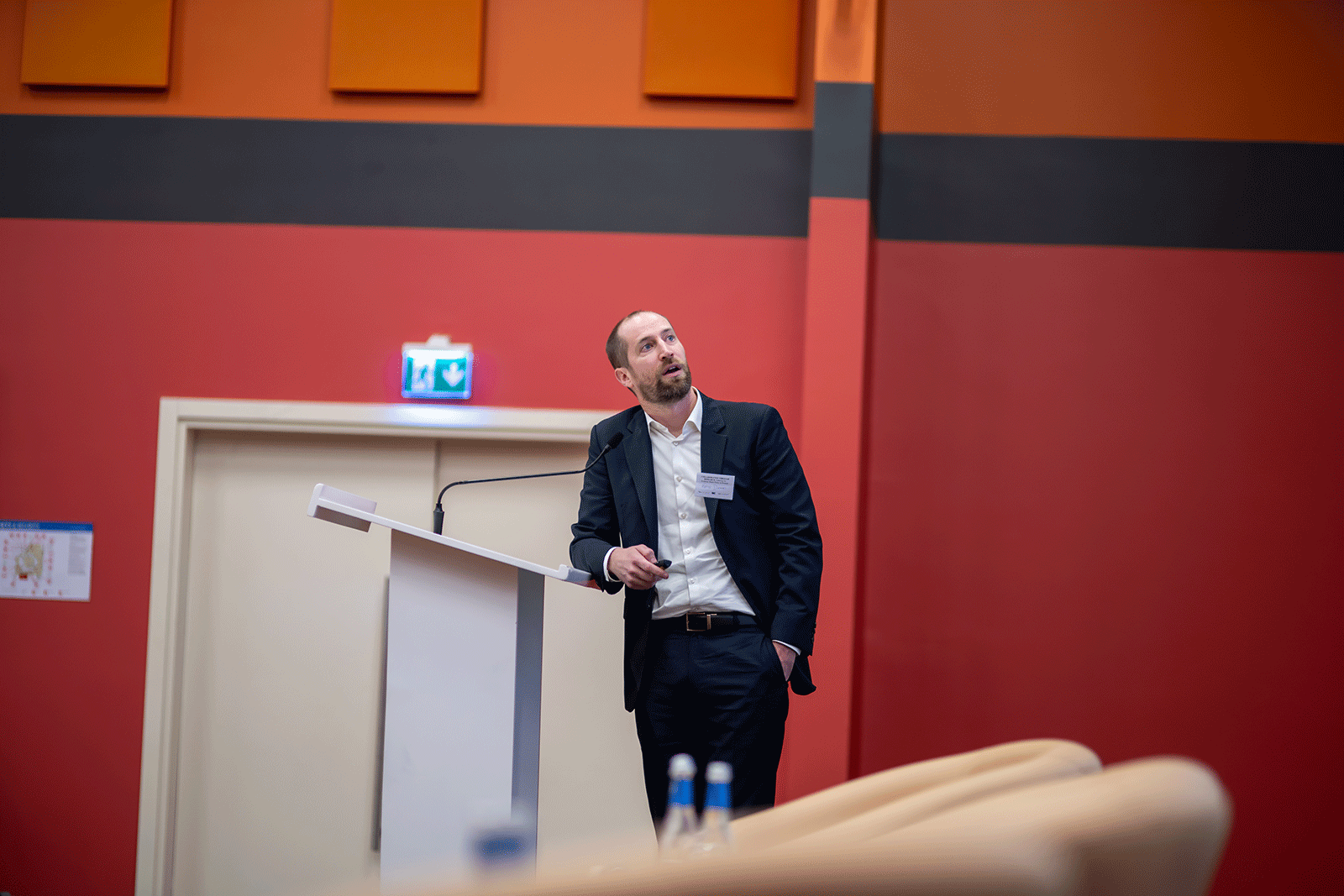
Alex McNeill, Chief Operations Officer for Bridges to Prosperity, commented on the importance of this study for policymaking, and how it affects the way that rural infrastructure and connectivity are conceptualized. Historically, many definitions of access have considered a community to be connected if it is within two kilometers of a feeder road – even if those 2 kilometers require passing over a challenging river. By quantifying the impact of trail bridges, policymakers are able to revisit targets in their efforts to address last-mile infrastructure.
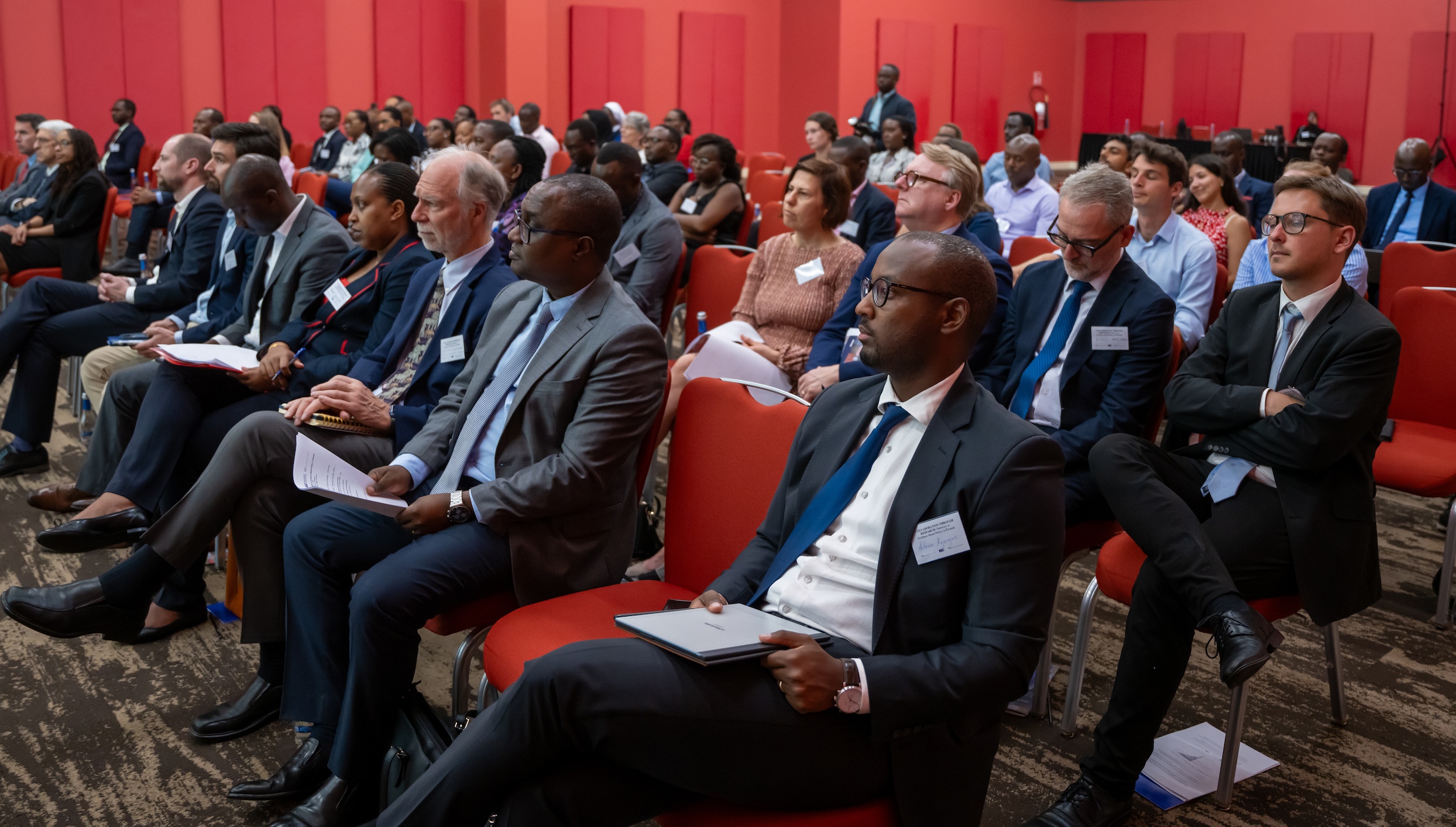
In an expert policy panel chaired by Richard Newfarmer, IGC Country Director for Rwanda and Uganda, Dr. Jean Chrysostome Ngabitsinze, the Minister of Trade and Industry, Dr. Jimmy Gasore, the Minister of Infrastructure, and Kampeta Sayinzoga, Chief Executive Officer of the Development Bank of Rwanda discussed the requisites for fruitful research-policy engagements. First, collaborators should be involved from the formative stages of the project in order to ensure policy relevance. Ms. Sayinzoga elaborated by saying that without policymaker inputs, research projects are often too generic or not answering questions that will motivate policy change – and will therefore fail to make an impact. As researchers engage policymakers, panelists also expressed the need to work within political and appointment cycles – driving home the need to have phased projects like that presented by Bergquist, which allowed for knowledge sharing and project adaptations to be made in an iterative manner with fewer disruptions due to changes in the political landscape. Panelists then emphasized that results should be translated into a non-technical language that focuses on synthesizing evidence and making concrete recommendations.
Panelists ended with three goals for future engagements. First, incorporating shocks – particularly those related to climate – into program design, evaluation, and prediction, will be increasingly important across all sectors. Second, researchers should include the indicators against which policymakers are measured into the impact evaluation matrices – whether this is job creation, cost effectiveness, or otherwise. Third, researchers should maximize effectiveness by engaging with existing data held by policy counterparts to help set the foundations of projects and answer time-sensitive questions.
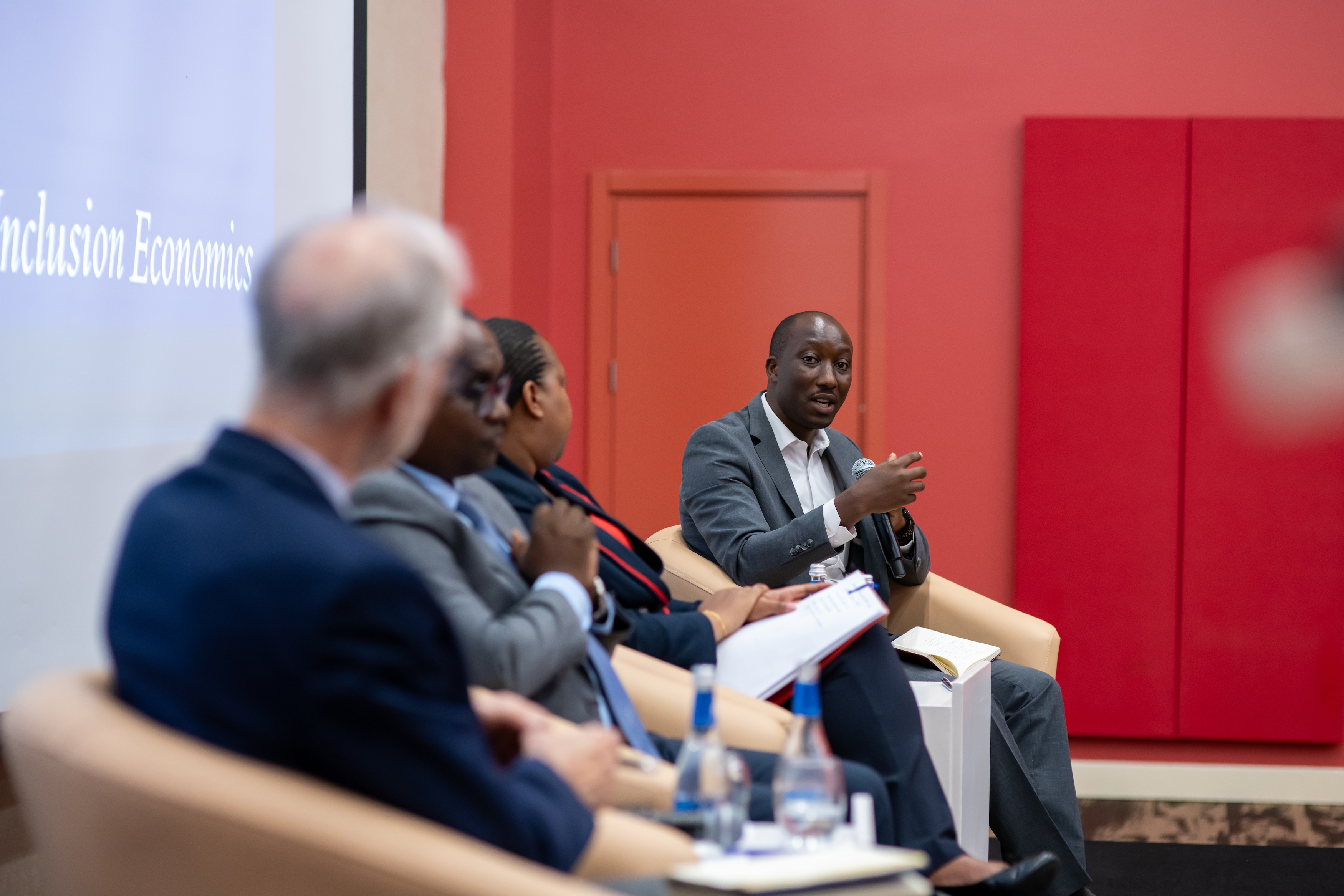
The event showcased how EGC and its affiliates engage in partnerships for applied economic research. The Center is home to a variety of research initiatives which support projects carried out in close collaboration with governments and other policy partners in low- and middle-income countries, resulting in a direct channel through which locally grounded research and emerging insights are able to benefit the lives of millions of people. Among these is Inclusion Economics, a collaboration between EGC and the Whitney and Betty MacMillan Center for International and Area Studies and a cohost of the event, which works actively in focus countries to generate, incubate and amplify research-policy linkages to answer questions on how to provide more equitable distribution of opportunity. EGC also hosts the Markets and Development initiative, which investigates questions at the intersection of industrial organization, trade, and development economics in low- and middle-income settings. EGC also engages with research centers outside of Yale, like the International Growth Centre, with in-country presence and deep expertise in promoting the evidence-to-policy pipeline.